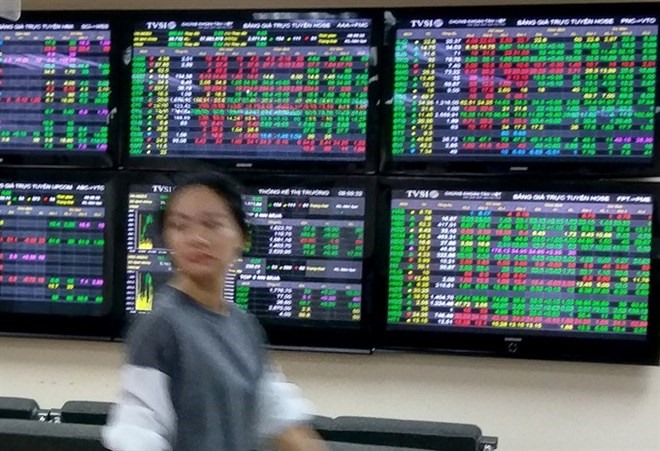Selling pressure is predicted to extend to this week’s trading, which may have negative impacts on the stock market, in the context of declining trade by foreign investors and unexpected movements in the US market.

Selling pressure is predicted to extend to this week’s trading, which may have negative impacts on the stock market, in the context of declining trade by foreign investors and unexpected movements in the US market.
The benchmark VN Index recorded the first weekly loss since the beginning of 2018, down 0.95 per cent in the week ending on February 2 at 1,105.04 points on the HCM Stock Exchange.
The negative movements also occurred on the Ha Noi Stock Exchange, with the HNX Index losing 2.25 per cent to close Friday at 123.97 points.
Cash flows showed signs of weakness and was withdrawn from the market. The average trading volume on the HCM Stock Exchange last week declined by over 20 per cent from the previous week, reaching 253.8 million shares, valued at VND8 trillion (US$351 million) per session.
Investors, however, were more active on the Ha Noi’s bourse, which pushed up the daily trading volume by over 6 per cent, averaging 88.6 million shares, worth VND1.5 trillion per session.
According to Tran Duc Anh, a senior analyst at Bao Viet Securities JSC, the pressure of profit taking in the market has increased significantly, causing declines in both stock indices.
Average prices of shares on the stock market have been pushed up to high levels after a prolonged rally, with strong growth of large-cap stocks, driven by their impressive business results in 2017 (such as steel, banking, securities, oil and gas), while investors tend to sell to lock in profits, in the absence of new supporting information.
The VN Index rallied 12.8 per cent in January, becoming one of the three fastest growing markets in the world in January. When evaluating the three-month period, Viet Nam’s benchmark index has grown 32.62 per cent, becoming the best performer in the world.
Most listed companies have announced their business results and the market will face an absence of information this week.
“With the upcoming Tet (Lunar New Year) holiday, investors using high financing leverage will sell out to avoid paying interest on margins,” Anh said, noting the State Securities Commission’s recent regulation to raise the margin ratio to 60 per cent, also helped discourage investors to borrow more money to purchase stocks.
In addition, global stock markets witnessed negative movements in the past week due to concerns over the US Federal Reserve’s possibility to accelerate it interest hike scheme, after the US economy reported positive changes.
“Viet Nam has clearer correlations with the global market, so I’m inclined towards the scenario that the market will continue its downward correction this week, with a moderate decrease,” Anh was quoted as saying on tinnhanhchungkhoan.vn.
“However, the downward trend will not occur across the market, but will have a wide divergence,” he said.
Large caps were under the heaviest profit-taking pressures last week, especially oil and gas stocks. Major energy companies, including Petrolimex, PetroVietnam Drilling Well Services (PVD) and PetroVietnam Technical Services (PVS), declined between 5-16 per cent.
Shares of leading banks and finance companies, which had been market supporters, also weakened and saw a divergence which failed to lift the market.
“As the holiday is approaching, the market, in the last sessions before Tet, may not be as active. However, there is no need for investors to rush and buy at these prices,” according to Hieu Nguyen, an analyst at Viet Dragon Securities Co.
Declining foreign trade
Not only is domestic money withdrawing from the market, but foreign investors are also showing signs of caution, reflecting in decreases in trading value on the HCM Stock Exchange.
Foreign investors continued to conclude as net buyers on the southern bourse last week, their seventh net buying week, but their net buy value decreased nearly 98 per cent compared to the previous week, to reach only VND39.2 billion. (They were responsible for net buy values of nearly VND1.7 trillion from January 22-26.)
On Ha Noi’s exchange, foreign traders were net sellers with a combined value of VND98 billion last week. – VNS





